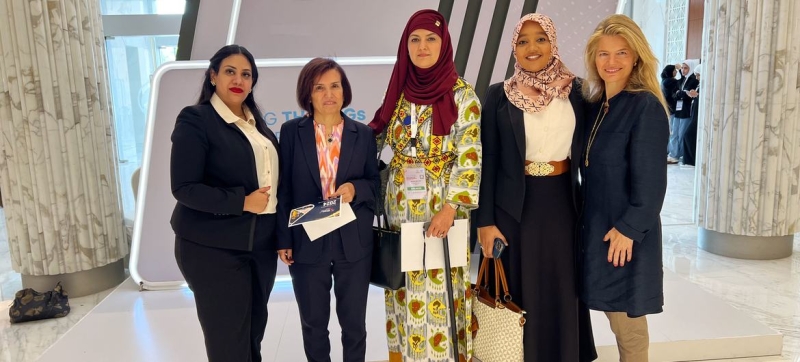
From left to right: Alaa Hamadto, Tahani Abu Dakka, Malalai Helmandi. UN Forum: Women building businesses and supporting their communities in times of conflict Economic Development
The World Enterprise Investment Forum, which took place in the Bahrain capital of Manama, this year focused, among other things, on women entrepreneurs in conflict zones. Women from Afghanistan, Algeria, Iraq, Sudan and Gaza took center stage on the final day of the event.
During a panel discussion on “Women, Peace and Security” and in an interview with UN News, women entrepreneurs shared stories about their projects and the challenges they face in helping their communities.
Business and Charity in Gaza
Tahani Abu Dakka, a Palestinian businesswoman from Gaza, left the enclave three weeks ago and was planning to return, but the checkpoint was closed, giving her an unexpected opportunity to attend the forum.
Abu Dakka said she was “the first Palestinian woman to work in Gaza to create jobs for women, such as clothing factories and bakeries” so that they could remain in the sector, since many residents had to look for work outside of it.
Conflict has long complicated her efforts to empower women, and with the outbreak of a new war the situation has only worsened.
“We had nothing, no banks, no money,” recalls Abu Dakka. The entrepreneur said that she recently got into debt for more than 2.5 million dollars, today she has no time for that, she thinks about her compatriots, women with children who were left without a roof over their heads. Today, the entrepreneur is trying to raise funds to purchase materials for the construction of temporary shelters.
“Jewish friends raised 5 thousand dollars for me so that I could get out of Gaza, but I allocated these money to build tents for the people,” she told UN News Service.
Life and dreams in Sudan
Sudanese mother of three daughters, Alaa Hamadto is the CEO and founder of clean technology startup Solar Food, which has pioneered the country’s dried food industry.
“Solar Food uses a sun drying process to produce a variety of organic dried food products,” she said.
Hamadto’s factory was destroyed during the conflict in Sudan. “We used to export our products to seven countries, including the UK, Saudi Arabia, the Emirates and Qatar,” explains the entrepreneur.
“My main goal was to improve life of people. This can be achieved by helping small farmers. I am also trying to spread the concept of solar drying and how it benefits people,” she added.
After war broke out just over a year ago, Hamadto “lost everything.” “Sudanese lives matter. Sudanese dreams matter. We have encountered terrible things. The Sudanese people have lost everything,” she stressed.
When the conflict broke out, Hamadto initially fled to Egypt, but later decided to return to Sudan.
“I decided to come back to build a factory, but it’s very difficult to work in Sudan right now,” she said, citing obstacles such as inflation, lack of equipment, problems with communications, frequent power outages and security threats, including bombing. Despite all this, she said Sudanese people are only becoming more resilient.
Opportunities for Afghan mothers
Malalai Helmandi, chief operating officer of solar energy company Helmandi Solar in Afghanistan, and her husband Hamid Helmand are implementing projects to empower women in the country. According to Malalai, in a culture like Afghanistan, the family unit is very important, and stability remains in those families where the mother is empowered, knowledgeable and has the ability to either have her own income or at least participate in decision making.
In turn, Helmand said that after three days of the forum he would return home with the belief that “through our efforts, ideas and thoughts,” women can once again receive job or other opportunities.
Iraq: Despite the Conflict
In 2018, the Iraqi government fought ISIS militants, but These challenging conditions haven’t stopped Basima Abdulrahman, founder and CEO of KESK, which works on green energy solutions.
“I decided to build a sustainable business because I loved sustainability, little did I know that it would end up being a climate change business,” Abdurrahman told UN News Service.
She said she was not afraid of the ongoing conflict because climate change is as big a threat as ISIS and must be fought.
The entrepreneur believes that for Iraq, the transition to renewable energy sources is not just a plan for the future or a luxury, but a necessity. The country faces a 50 percent electricity shortage, a gap that is currently being filled by polluting generators. This method is too expensive and cannot fully satisfy energy needs.
Voices of businesswomen on the forum
Head of the department United Nations Industrial Development Organization (UNIDO) in Bahrain Hashim Hussein, who participated in the forum, said he was proud that participants were able to speak out and be heard at the event, which was held under the auspices of the UN. Hussein added that the forum drew international attention to the problems faced by women in conflict situations and helped find ways to help them.
Read also:
